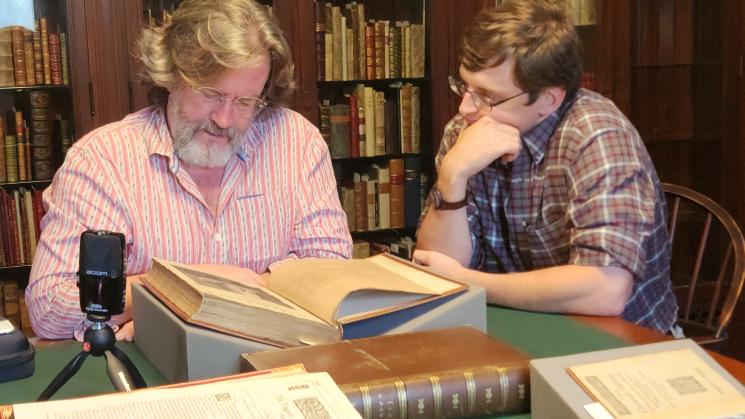Shakespeare at the JCB

A visit from Gregory Doran, Artistic Director Emeritus of the Royal Shakespeare Company, generated a buzz at the John Carter Brown Library (JCB) on Thursday, September 20. Doran had come to Brown as part of his effort to personally view as many of the Shakespeare First Folios as possible. The University is actually home to more than one of these exceedingly rare texts, making it an especially remarkable part of Greg’s tour. During his brief visit to the institution, Doran met with the Director of the JCB, Karin Wulf, and with Research and Reference Librarian Mark Armstrong and examined the First Folio and other books that are rarely displayed at the institution.
In an effort to showcase the JCB’s First Folio both as an object and in historical context, Armstrong set out a few related texts for Doran to examine. These included the Third Folio, one play from the “False” Folio, and a volume that Shakespeare himself is thought to have consulted.
“What’s remarkable about this assemblage of only four books is the number of conversations they can generate–whether we want to pursue Shakespeare’s legacy in seventeenth-century print, or if we are curious about what text and material fed the creation of his plays and characters, or why the First Folio has been granted a totemic status within the larger context of book history, we can pull on these threads just with what’s on the table,” Mark explained.
The two experts (pictured above) began by discussing the First Folio and its unique history. Mark explained that the JCB’s copy has a few distinctions that set it apart from the other 234 extant Firsts. The first of these -that it is the only copy in which Troilus and Cressida is placed after Timon of Athens and before Julius Caesar- is perhaps a quirk resulting from its rebinding at some point in the mid nineteenth-century, when it was in the possession of Robert Samuel Turner (1818-1887). Turner sold it to London-based dealer F.S. Ellis, from whom Sophia Augusta Brown purchased it (and the Second and Third Folios) in 1879.
Quite notably, this purchase makes Sophia, who already owned a copy of the Fourth Folio, the earliest known woman to collect all four Shakespeare folios. She signed her name, triumphantly, to the vellum end leaf of the First Folio, and not to the others.
To situate our First Folio within the larger history of Shakespeare’s life in print, we turned to the JCB’s copies of The chronicle history of Henry the fift, vvith his battell fought at Agin Court in France, and the Third Folio. Four years before the printing of the First Folio, Isaac Jaggard and Thomas Pavier embarked on an illicit attempt to print Shakespeare’s works–an endeavor often referred to as the False Folio. It now exists only in two complete copies, and several fragments. Henry was one play printed for this collection, and its false imprint and its discrete collation (a kind of printed formula that enabled bookbinders to assemble a complete printed book after printing) attest to Jaggard and Pavier’s knowledge of wrongdoing.
The Third Folio, the rarest of the four–the bulk of its copies destroyed in the 1665 fire of London–also marks the return of Shakespeare to print and stage in England following the fall of Oliver Cromwell and the restoration of King Charles II to the throne of England.
The JCB’s core collections contain several books Shakespeare is thought to have consulted. Leo Africanus’ A geographical historie of Africa, printed in London in 1600, is one such book, bearing similarities to minor plot points in Othello. Leo Africanus himself is perhaps a model for the play’s titular character. Shakespeare was an expansive reader and researcher whose mind reached globally at a time when the British understanding of the globe was itself expanding, and the JCB can draw on our collections to triangulate his thinking, and to contextualize his work.
Our Director and team are grateful to Gregory Doran for giving us an opportunity to examine these fascinating volumes and talk about a few of the many unique aspects of the collections at the John Carter Brown Library with a true expert and enthusiast. We wish him all the best on his quest to visit First Folios around the world!
Interested in learning more? Visit the JCB in person or online. Details at jcblibrary.org.